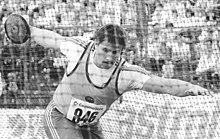Jürgen Schult (athlete)
| Jürgen Schult (athlete) medal table |
||
|---|---|---|
 Jürgen Schult (athlete) |
||
|
|
||
| Olympic games | ||
| gold | 1988 Seoul | 68.82 m |
| silver | 1992 Barcelona | 64.94 m |
| World championships | ||
| gold | 1987 Rome | 68.74 m (CR) |
| bronze | 1993 Stuttgart | 66.12 m |
| bronze | 1997 Athens | 66.14 m |
| silver | 1999 Seville | 68.18 m |
| European championships | ||
| gold | 1990 split | 64.58 m |
| bronze | 1994 Helsinki | 64.18 m |
| silver | 1998 Budapest | 66.69 m |
Jürgen Schult (* 11. May 1960 in Neuhaus / Elbe , district Hagenow , district of Schwerin , DDR ) is a former German athlete , who - for the GDR starting - 1988 Olympic champion in the discus throw was. On October 1, 1988, he won the last Olympic gold medal for the GDR. On June 6, 1986, he set the still existing world record in discus throwing with a width of 74.08 m (as of May 2020).
Later, in a long sporting career that lasted until the end of the 20th century, he was able to build on this success in the all-German team. Among other things, he was second in the 1992 Olympics and second in the 1999 World Cup.
Athletic career
After he had missed the 1984 Olympic Games in Los Angeles due to the GDR's Olympic boycott, Jürgen Schult achieved fame in June 1986 with a world record that still exists today: with 74.08 m, he exceeded the valid best of Yuri Dumtschew (Soviet Union) by the extraordinary Difference of 2.22 meters.
In 1988, at the first and last international athletics match between the GDR and the Federal Republic of Germany, a scandal broke out when Schult refused to congratulate Wolfgang Schmidt , who he had defeated and who had recently moved from the GDR to the Federal Republic. This behavior was instructed by the GDR sports management.
Jürgen Schult is 1.93 m tall and weighed 110 kg when he was active. He started in the GDR era for SC Traktor Schwerin and trained with Hermann Brandt, later he joined the Schweriner SC and SC Riesa and was his own trainer from 1993 to 2000. He has a degree as a qualified sports teacher and in 2001 became the national coach of the German Athletics Association for men's discus throwing. In January 2011 he was appointed chief national coach for the throwing and pushing disciplines. In this position, he was replaced by Marko Badura in September 2018 and was henceforth responsible for athletics training at the Federal Police Sports School in Kienbaum .
Doping in the GDR
1991 Doping opponents could Brigitte Berendonk and Werner Franke several dissertations and postdoctoral theses former East German doping researcher in the Military Medical Academy Bad Saarow sure. Based on the work, the participation in the GDR state doping of many well-known GDR competitive athletes, including Jürgen Schult, was reconstructed. According to the information, Jürgen Schult received high doses of Oral-Turinabol from 1981 to 1984 . He later admitted that he had told the investigators of the Central Investigation Team for Government and Association Crime the untruth when he testified that he had heard of Oral-Turinabol only after the fall of the Wall. That is why he had to pay 12,000 marks in 2001. Schult has always denied the use of anabolic steroids.
Awards
- 1988 - Patriotic Order of Merit in Gold
Successes in detail
- 1979, Junior European Championships: 1st place
- 1983, World Championships : 5th place (64.92 m)
- 1986, European Championships : 7th place (64.38 m)
- 1987, World Championships : 1st place (65.80 - 68.74 m - 66.18 - 67.36 - 66.74 - 65.94)
- 1988, Olympic Games : 1st place ( 68.82 m - 67.92 - 65.76 - 68.18 - 65.70 - 68.26)
- 1990, European Championships : 1st place ( invalid - 61.62 - 63.32 - 62.08 - 63.70 - 64.58 m )
- 1991, World Championships : 6th place
- 1992, Olympic Games : 2nd place (64.26 - 63.54 - 63.84 - 63.38 - 64.94 m - 63.08)
- 1993, World Championships : 3rd place
- 1994, European Championships : 3rd place
- 1995, World Championships : 5th place
- 1996, Olympic Games : 6th place
- 1997, World Championships : 3rd place
- 1998, European Championships : 2nd place
- 1999, World Championships : 2nd place
- 2000, Olympic Games : 8th place
literature
- Volker Kluge : Schult, Jürgen . In: Who was who in the GDR? 5th edition. Volume 2. Ch. Links, Berlin 2010, ISBN 978-3-86153-561-4 .
Web links
- Jürgen Schult in the database of World Athletics (English)
Individual evidence
- ↑ IAAF Records - Discus Throw Men. Retrieved May 25, 2020 (English).
- ↑ DLV appoints two senior DLV national coaches. German Athletics Association , January 17, 2011, accessed on May 25, 2020 .
- ↑ Marko Badura becomes the new head national coach litter. German Athletics Association , September 21, 2018, accessed on May 25, 2020 .
- ↑ Brigitte Berendonk: Doping documents - From research to fraud. Springer-Verlag, Berlin 1991, ISBN 3-540-53742-2 , p. 128, table 8
- ↑ "A role model in performance and demeanor" deutschlandfunk.de July 25, 2010
- ^ Johannes Freytag: Jürgen Schult: world record holder with flaws. ndr.de , May 11, 2020, accessed on May 25, 2020 .
- ↑ edition of 12.11.1988. New Germany Archive, p. 4 , accessed on May 25, 2020 .
| personal data | |
|---|---|
| SURNAME | Schult, Jürgen |
| BRIEF DESCRIPTION | German discus thrower and Olympic champion |
| DATE OF BIRTH | May 11, 1960 |
| PLACE OF BIRTH | Neuhaus / Elbe , district Hagenow , district of Schwerin , DDR |
